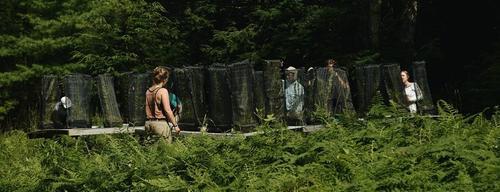
The Yale School of Forestry and Environmental Studies invites undergraduate students to spend the summer working on field ecology research through the Louise H. and David S. Ingalls Field Ecology Program. Interns are matched with professors, post-doctoral researchers, and graduate students on a project in field ecology. Interns are housed at the Yale-Myers Forest camp in northeastern Connecticut. In 2020, the program is anticipated to run from June 8th-July 31st.
Research Projects for 2020
We anticipate two primary projects for the 2020 field season. Additional projects may be added as the field season approaches. Opportunities may be available to work occasionally on other, short-term projects. Please get in touch if you have a specific area of interest within ecology, and we can advise you as to whether it is likely that you would have the opportunity to work in that area during this internship.
ForestGEO Permanent Forest Census Plot: The Smithsonian’s Forest Global Earth Observatory (ForestGEO) project began in Panama in 1980 with the aim to improve understanding of forest ecology and development through the installation of long-term forest census plots. Since then, the same protocol has been replicated at 67 sites across six continents. This network of sites and the data they produce have contributed numerous significant advancements, both theoretical and applied, in our understanding of how forests establish, function, and change through time and management. The establishment of a new ForestGEO site at Yale-Myers Forest is being led by a group of faculty members from several disciplines from soil ecology, to tropical forest ecology, to forest management, and understory plant communities.
Understory Plant Invasions & Forest Disturbance: This project examins the impacts of forest disturbance and understory plant invasions on soil nutrient cycling in recently harvested forest stands. The project will consist of a field experiment and is designed to look at the effects of three invasive plants that commonly co-occur with one another: Japanese honeysuckle, oriental bittersweet, and multiflora rose. Intern(s) will help collect post-harvest soil and vegetation data, set up experimental plots, sample soil and vegetation within the plots, and work in the lab to prepare and analyze soil samples.
Accommodations
Interns will live within the vibrant summer population of the Yale-Myers Forest camp - a small, close-knit community of researchers and graduate student apprentices in forest management. Housing is available in bunkhouses, and hot dinners are provided by a camp cook during the work week. There are ample opportunities for recreation such as canoeing, swimming, hiking, and generally enjoying a beautiful location. Yale-Myers Forest camp is located 40 minutes from Hartford, and is within a 1.5 hour drive of Boston, Providence, and New Haven.
Qualifications
Interns should be undergraduate students looking for research experience to further their academic goals. Some coursework in environmental science is useful, but not required.
Funding
Yale students should submit an application to the EVST Summer Fellowship (Deadline: March 27, 2020) concurrent with their internship application. First year Yale students should also consider the First Year Summer Research Fellowship in the Sciences and Engineering (Deadline: March 5th, 2020).
We are happy to provide supporting materials for any students’ applications for funding. Please reach out if you are considering applying for the internship and are preparing funding applications. Many fellowships require letters of support from sponsors, so please contact us to talk about your application early in the process.
To Apply:
The 2020 application is now available, and will close on February 28th, 2020.
Application Checklist:
- Online Application including:
- CV or resume, including relevant coursework
- Personal Statement / Letter of Interest: This is an opportunity for you to share with us about your background, personal and professional interests in ecology, what you hope to learn during this program, which of this summer’s project(s) you may be most interested in, and your career objectives. 250-750 words.
- Letter of support from a faculty member. Letters should be emailed directly to Laura.Green@yale.edu with the subject line “Field Ecology Internship Reference (Applicants Name)”
